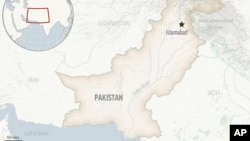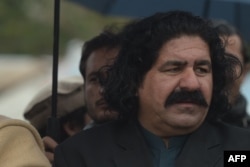Pakistan is bracing for a new military offensive that is expected to target militants in the northwest as ethnic Pashtuns in the area say they are still looking for accountability for the army's last offensives in the region, in 2014 and 2017.
Early this month, the country’s national security committee, comprising top civilian and military leaders, announced it was launching a comprehensive, nationwide anti-militant operation to halt a rise in attacks on security forces by the Pakistani Taliban and other extremist groups.
While the statement did not explicitly mention a military operation, past comprehensive plans have included large-scale military action.
Later, in a rare in-camera briefing to the lower house of the Parliament, according to lawmakers who declined to be identified, army chief Gen. Asim Munir said that the military was not launching a new operation but continuing its existing strategy.
Pakistani security and law enforcement agencies have increased intelligence-based operations against militants in the last few months following an increase in terrorist activity. However, residents of Khyber Pakhtunkhwa province that borders Afghanistan remain concerned about the possibility of wider military action.
Pakistan's government has said that previous operations led to a drop in terrorist attacks; however, Pashtun civil society members and peace activists say it came at a steep cost to many innocent people.
"The generals and those involved in bringing back armed men [militants] to the area haven't been arrested and have not [been] held accountable. … We will oppose any [new] operation," an elected member from South Waziristan, Ali Wazir, told Parliament on April 7 after the government disclosed its intentions for another offensive.
Rights activists say previous military-led operations in their region killed tens of thousands, displaced millions, destroyed towns and market centers, and led to the creation of a harsh security law that gives the armed forces sweeping powers in the whole province of Khyber Pakhtunkhwa, including the former federally administered tribal areas.
Wazir is a household name in Pakistan for his opposition to extrajudicial killings, forced disappearances, illegal detentions, landmines and the Taliban's shadow rule in the Pashtun region. He was in jail for half of his 60-month term in Parliament, purportedly for his opposition to Pakistan's former chief General Qamar Javed Bajwa.
Earlier this month, Pakistan Prime Minister Shehbaz Sharif responded to Wazir's opposition by saying he would work to assuage local fears over the operation.
"I want to tell members from Waziristan that their concerns will be heard, and they will be answered," the prime minister said on the floor of the lower house.
Defense Minister Khawaja Mohammad Asif also supported the stance of the Waziristan members of Parliament and told the house that "they [MPs] are right in saying that those people [involved in talks with militants] should be reckoned with."
News spreads fear
Leaders and activists of the Pashtun Tahaffuz Movement (PTM), a nonviolent Indigenous organization with serious reservations about the army's series of operations, are skeptical of the motive and timing of the announcement of the new operation, which could come during an election year and would be the military's first offensive since the withdrawal of U.S. and NATO troops from Afghanistan.
"The announcement of yet another military operation has indeed spread fear among locals because what they saw in the past operations was they were the ones who suffered the most," said Idris Bacha, a civil rights activist from Swat and the leader of a local movement, the People's Resistance Against Militancy.
"Someone needs to tell us, what did they achieve in the previous campaigns? 80,000 people have been killed, whole villages destroyed, and their bazaars lay in ruins. They don't want to see that happen again," Bacha told VOA.
Marvin Weinbaum, a longtime regional analyst with the Washington-based think tank Middle East Institute, shares Bacha's concerns.
"I am very skeptical that there will be anything like a campaign they had in 2014, when they pushed them out of North and South Waziristan. I am skeptical of that in part because [of] the feelings in the tribal areas where they suffered terribly when that campaign was on its way. Many, many thousands were evicted from their homes. They became refugees."
Other activists have gone further, saying they will actively oppose a military campaign.
"We are united against another war in our area. The military can force us to leave our houses again, but we won't leave them on our own will," South Waziristan writer and social activist Shehrayar Mehsud told VOA in a Twitter Spaces conversation.
Pakistan economy
Others see a financial benefit in launching such an operation as Pakistan waits for another major International Monetary Fund bailout loan.
"We have said it before that in the past whenever Pakistan needed money, they would launch an operation in Pashtun areas to get funds from abroad," said Mir Kalam Wazir, a former provincial legislator and PTM supporter from North Waziristan.
"Looks like it's the same this time, too. With Pakistan's difficult economic situation, they need funds, especially from the U.S.," Wazir continued.
The U.S. gave Pakistan billions of dollars during the height of the war on terrorism, but aid dropped off sharply during the Trump administration. Last year, the total reported U.S. aid to Pakistan was around $150 million.
That drop in aid and the departure of foreign troops from Afghanistan have led some to question whether Islamabad has the capacity to carry out an offensive while its economy is under severe strain.
Pakistan hopes the suspended IMF bailout package will resume so it can avoid defaulting on its debt obligations. The IMF has stalled its $6.5 billion program since November, while a bruising political battle rages between the sitting coalition government and former Prime Minister Imran Khan.
"We are talking of a campaign which is very expensive, at a time when Pakistan is struggling to read its bills, particularly its debt obligations," Weinbaum told VOA.









